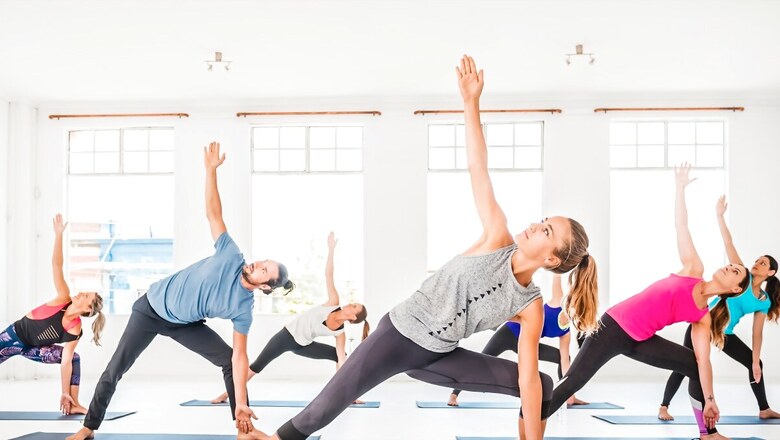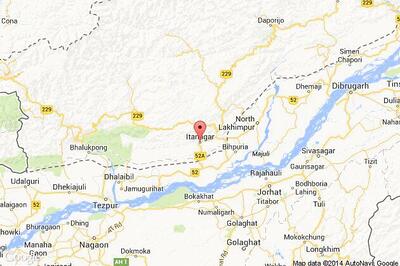
views
Yoga and Sports – what’s the connection? Plenty, it seems, if one were to consider a three-day international conference hosted by S-VYASA Yoga University earlier this month.
Themed ‘Integrative Sports Medicine and Rehabilitation’, the 2024 edition of INCOFYRA (International Conference on Frontiers in Yoga Research and its Applications) discussed aspects related to comprehensive and sustainable medical care for athletes and sportspersons. It brought together scholars, researchers and practitioners from around the globe to explore how Yoga, sports medicine and rehabilitation intersect.
INCOFYRA, S-VYASA University’s flagship event for over two decades, has been a platform where critical scientists and clinicians are invited to disseminate latest research updates.
“We believe that continued multidisciplinary, international collaboration will stimulate the development of sports medicine. The 25th INCOFYRA was tailored for physical therapists, integrative and conventional medicine-based sports rehabilitators, athletic trainers, primary care physicians and researchers interested in understanding of sports-medicine science, diagnosis and treatment. Its aim was to achieve high levels of confidence and competence in these areas, optimising the care of the athletes,” said Dr HR Nagendra, Founder-Chancellor, S-VYASA University, Bengaluru and chief patron of the conference.
PHYSIOTHERAPY COUPLED WITH YOGA SHOWED BETTER OUTCOMES THAN PHYSIOTHERAPY ALONE
The increasing popularity of sports and exercise has aided the growth of sports medicine substantially.
Conventionally, sports medicine and rehabilitation include medical and surgical interventions followed by physiotherapy and fitness training, and nutritional supplementation. Increasingly though, global trends are veering towards including traditional methods, with sportspersons often themselves demanding the same.
Dr BR Ramakrishna, Vice-Chancellor of S-VYASA University, corroborates. “There is an emerging build-up of the evidence base of integrative medicine, along with its increasing popularity and acceptance among athletes and sports-medicine practitioners. The indigenous system of healthcare has been found very effective in managing several chronic diseases, ensuring fitness for sports persons, and healing sports injuries.”
“A systematic integration of complementary medicine with conventional methods is an unmet need to attain optimal performance, sports-related injury prevention and effective functional rehabilitation of sports personnel,” says NK Manjunath, Director of Research, S-VYASA University.
“There is a growing recognition of the benefits of integrating yoga into rehabilitation protocols. Yoga is an ancient Indian system of mind–body medicine that combines physical postures, regulated breathing, relaxation techniques and meditation. Yoga showed better outcomes for managing pain, stiffness, and functional subscales of the WOMAC scale when complemented with physiotherapy, compared to physiotherapy alone,” he reveals.
STRENGTHENING THE ‘EVIDENCE BASE’ ON TRADITIONAL MEDICINE: INDIA LEADING
The World Health Organisation (WHO) newsroom has an interesting feature story titled `How a British long jumper embraced yoga and never looked back’, that talks about how “athletes’ workout plans are increasingly incorporating slow, measured movements such as the practice of yoga”, whether in recovery or for prevention against injuries.
Nevertheless, the WHO, while acknowledging that yoga and other traditional medicine systems are “an important and often underestimated health resource”, still talks about the need for strengthening “the evidence base on yoga, and show, in a systematic and standardised way, how it contributes to physical and mental health”.
Towards this end, with the help of the Government of India, WHO set up the ‘Global Centre for Traditional Medicine’ in Jamnagar, Gujarat, and also convened a Global Summit on Traditional Medicine in August 2023.
Such exchange of ideas, best practices and evidence-based scientific sessions that were part of the 25th INCOFYRA come handy in this context. This conference helps the cause of health of sportspersons, but also brings in that crucial element of research and evidence-backed claims in complementary therapies.
The event witnessed scientific sessions with evidence-based insights, nine keynote talks, 27 symposium talks and several workshops. It saw the participation of 55 international and national experts, and 600 delegates. Prominent personalities, including sportspersons and champions, were invited as guests, with ICCR President Dr Vijay Sahasrabuddhe as the chief guest.
There was also a special roundtable discussion on ‘Challenges in Integrative Rehabilitation and Policy-Making in Integrative Sports Medicine’, where several eminent persons and policy stakeholders participated.
INSIGHTS ON STRENGTHENING THE MIND-BODY-SOUL-GLUTES-BIOMECHANICS-DATA SCIENCE CONNECTION
- Yoga asana and pranayama to strengthen the core aspects of body, calf, glutes and chest for future sportsmen – Srinivasa Murthy, Indian basketball coach
- Performance in sports and biomechanics: how understanding the mechanics of the human body can unlock new levels of athletic achievement – Mark Arthur King, Professor of Sports Biomechanics, Loughborough University
- Advances in sports nutrition and dietary strategies. Importance of nutrition for an athlete’s success, energy levels, recovery – Geetha Ghaliyavar, leading sports nutritionist
- The National Education Policy 2020 and its emphasis on physical fitness and inner happiness – Dr Ganesan Kannabiran, Director, NAAC, Bengaluru
- Role of yoga therapy integrated with data science to augment sports medicine and other treatments – Chieko Kato, Sports Psychologist, Toyo University, Japan
- Strategic approach to integrating yoga in sports rehabilitation – Manjunath NK, Director of Research, S-VYASA University
- Key concept of allostatic load with a host of domain specific biomarkers, from the perspective of sports personnel – Diego Bonilla, CEO & Scientific Director, DBSS International, Colombia
- Latest trends in sports rehabilitation – Thiagarajan Alwar, MD (Sports Medicine), specialist in Arthroscopy
- Conservative techniques in meniscus surgery – Dr Jagadeesh PC, Sports-specialized orthopaedic surgeon
- Elevating athletic performance by integrating yoga into sports medicine and rehabilitation – Dr Dobson Dominic, MD (Sports Medicine), Chennai
The author is a journalist, cancer survivor and certified yoga teacher. She can be reached at [email protected]




















Comments
0 comment